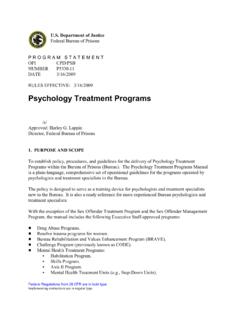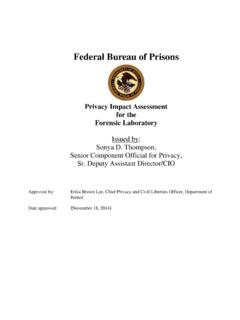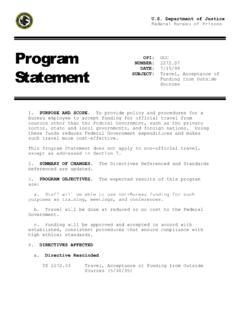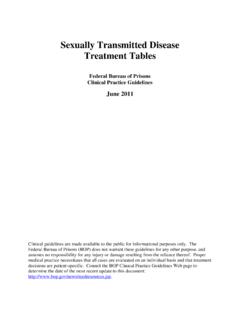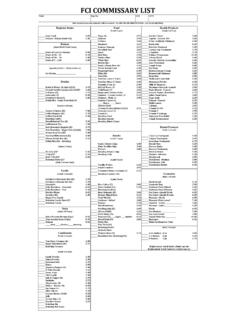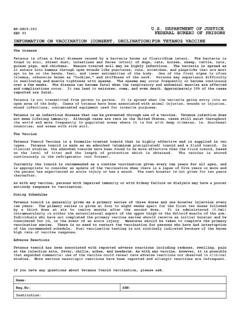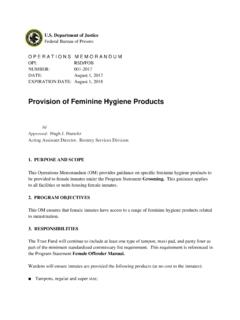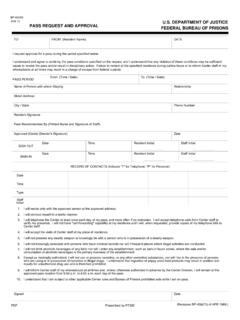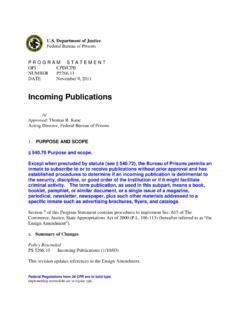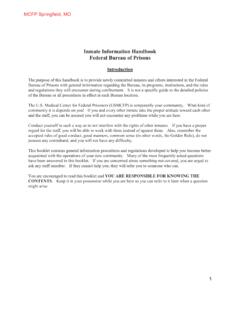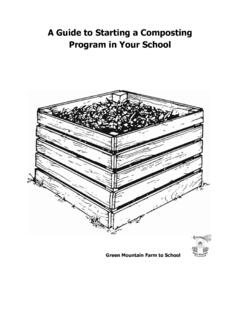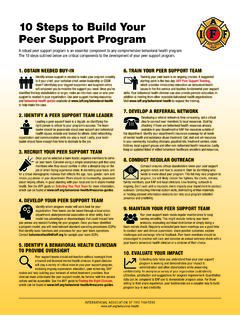Transcription of FIRST STEP ACT Approved Programs Guide
1 Department of Justice Federal Bureau of Prisons Washington, DC. Reentry Services Division February 2021. FIRST step ACT. Approved Programs Guide The Federal Bureau of Prisons (Bureau) protects public safety by ensuring federal inmates receive relevant and meaningful reentry programming to support their return to the community as law-abiding citizens. Reentry efforts increase opportunities, reduce recidivism, promote public safety, and reduce institution misconduct. To this end, the Bureau is committed to provide a robust menu of Programs to address thirteen need areas for a diverse inmate population, located in 122 institutions of varying security levels across the nation.
2 The FIRST step ACT Approved Programs Guide (FSA Guide ) is a collection of the Bureau's robust reentry Programs , designed to ensure all sentenced inmates have the skills necessary to succeed upon release. The Approved Programs are standardized across institutions, described in the Bureau's national policies, implemented with dedicated resources, and regularly reviewed to ensure program fidelity. Standardized Programs in the FSA Guide have fully developed and evaluated protocols that must be adhered to as written. The FIRST step Act (FSA) of 2018 created two different categories of Programs highlighted in the FSA Guide that replaces the, now obsolete, Directory of National Programs and the Inmate Model Programs Catalog.
3 The two FSA categories include Evidence-Based Recidivism Reduction (EBRR) Programs and Productive Activities (PAs). The FSA requires the Bureau to implement a risk and needs assessment system. Risk refers to the likelihood that each individual inmate will reoffend or recidivate after release. PATTERN calculations identify who is most at risk, measured as high, medium, low or minimum risk of recidivism. Need refers to the specific areas an inmate can address to lower his/her risk. In other words, need indicates what issues affect an inmate's risk and what he/she should address by taking Programs .
4 The Bureau assesses needs in 13 areas that directly impact one's ability to live a healthy and productive life. Specifically, these areas are Anger/Hostility; Antisocial Peers; Cognitions;. Dyslexia; Education; Family/Parenting; Finance/Poverty; Medical; Mental Health;. Recreation/Leisure/Fitness; Substance Abuse; Trauma; and Work. Inmates are recommended to enroll in the Approved Programs designed to address their individual needs. As outlined in the FSA, eligible inmates are required to earn FIRST step Time Credits for the completion of Approved EBRR Programs and PAs. Inmates may not earn FTCs for a current or prior sentence for a disqualifying conviction.
5 FTCs apply to inmates convicted in Federal District Court only. They DO NOT apply to military prisoners, state boarders, inmates convicted in DC. Superior Court, or inmates with a final order of deportation. The FSA Guide contains a program description, hours of program credits, institution locations, needs addressed and the responsible department(s) or staff for program delivery, ( , Education, Psychology, Special Populations Programs Coordinator, Reentry Affairs Coordinator). For locations noted as available at all BOP institutions, this means the program can be offered anywhere.
6 Programs will vary based on the needs of the sentenced population of those locations. Similarly, some Programs have pre-requisites or other required admission criteria. For additional information on these Programs , contact the Reentry Services Division (RSD) by sending an email to More specific inquiries about these Programs should be directed to the responsible disciplines identified in the Program Delivery section of each program. The FSA Guide will be updated annually by the Reentry Services Division. February 2021. TABLE OF CONTENTS. EVIDENCE BASED RECDIVISIM REDUCTION (EBRR) Programs #.
7 ANGER MANAGEMENT 4. ASSERT YOURSELF FOR FEMALE OFFENDERS 5. BASIC COGNITIVE SKILLS 6. BRAVE* 7. BUREAU LITERACY PROGRAM 8. CHALLENGE PROGRAM* 9. COGNITIVE PROCESSING THERAPY 10. CRIMINAL THINKING 11. DIALECTICAL BEHAVIOR THERAPY 12. EMOTIONAL SELF-REGULATION 13. FEDERAL PRISON INDUSTRIES 14. FEMALE INTEGRATED TREATMENT (FIT)* 15. FOUNDATION 16. ILLNESS MANAGEMENT & RECOVERY 17. LIFE CONNECTIONS PROGRAM 18. MENTAL HEALTH step DOWN PROGRAM* 19. NATIONAL PARENTING FROM PRISON PROGRAM 20. NON-RESIDENTIAL DRUG ABUSE PROGRAM 21. OCCUPATIONAL EDUCATION PROGRAM 22. POST-SECONDARY EDUCATION 23.
8 RESIDENTIAL DRUG ABUSE PROGRAM (RDAP)* 24. RESOLVE PROGRAM 25. SEEKING SAFETY 26. SEX OFFENDER TREATMENT PROGRAM NON-RESIDENTIAL 27. SEX OFFENDER TREATMENT PROGRAM* 28. SKILLS PROGRAM* 29. SOCIAL SKILLS TRAINING 30. STAGES PROGRAM* 31. THRESHOLD PROGRAM 32. PRODUCTIVE ACTIVITIES 33-43. BOP INSTITUTION INDEX 44-45. RDAP LOCATIONS 46. *RESIDENTIAL (MODIFIED THERAPEUTIC COMMUNITY). February 2021 3. ANGER. MANAGEMENT. DESCRIPTION. Anger Management for Substance Abuse and Mental Health Clients is a cognitive-behavioral curriculum designed to help individuals better manage their anger.
9 The protocol can be used in a 12-session group or in an individual format. The curriculum is available in English and Spanish. The workbook is designed to be used in group treatment by individuals with substance abuse or mental disorders. It provides participants with a summary of core concepts, worksheets for completing between-session challenges, and space to take notes for each of the sessions. The concepts and skills presented in the anger management treatment are best learned by interactive practice, review, and by completing the between-session homework. HOURS. 18 hours of EBRR program credits.
10 LOCATIONS. Available at all BOP institutions. NEEDS. Anger/Hostility and Cognitions PROGRAM DELIVERY. To ensure program fidelity and proper credit, Anger Management must be delivered by Psychology Services staff. February 2021 4. ASSERT YOURSELF. FOR FEMALE OFFENDERS. DESCRIPTION. This program for incarcerated women addresses ineffective interpersonal communications and behavior that can lead women to feel helpless about their lives. The majority of female offenders have been the victim of abuse. In this program women learn to be assertive without trampling the rights of others.
